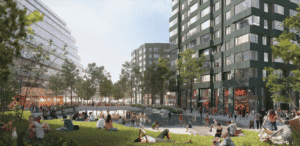The initial phase of Harvard University’s 900,000-square-foot research campus in Allston will set new high water marks for affordable housing and investment by minority-owned firms.
Lingering disagreements between Harvard and an advisory committee that’s been reviewing the proposal for 18 months were resolved after intervention by Mayor Michelle Wu and Boston Planning and Development Agency Director Arthur Jemison II, resulting in the agency’s directors approving the initial phase of the office, lab, hotel and housing complex Thursday.
The 263,500-square-foot housing component proved to be the biggest sticking point. A coalition of Allston activists demanded that Harvard limit gentrification and displacement by reserving 33 percent of the housing component as income-restricted.
The university and its private development partner, Tishman Speyer, had previously proposed 17 percent affordability in the first phase, before agreeing this month to the 25-percent figure which is the highest required in Boston to date for a private development project.
“The most important thing is we have a precedent and we have something to point to now,” said Jaimie McNeil, general agent for the Unite Here Local 26 hotel workers’ union, referring to the affordability percentage. “This is a huge victory for the city of Boston.”
Developers raised $30 million in equity from 150 minority investors, which is believed to be the largest sum for a project on privately-owned land in Boston to date, Tishman Speyer Senior Managing Director Michelle Adams said.
Activists and elected officials had protested Harvard’s earlier proposals for the 9.4-acre site on Western Avenue as insufficient to reflect the rapid increases in rents and real estate prices in Allston. The Coalition for a Just Allston + Brighton had asked for 33 percent of the 345 housing units to be income-restricted.
While indicating her support of the final version, Harvard Allston Task Force member Barbara Parmenter said the process served as an example of what Wu decried as a broken planning process when calling for BPDA reform as a city councilor.
“We are in a housing crisis, a transportation crisis and a climate crisis,” Parmenter said. “The redevelopment of our neighborhood can help address all of these if we have honest, open, frank and productive conversations.”
The Western Avenue project also includes a 440,000-square-foot office-lab building and a 196,500-square-foot hotel and conference center.
Harvard agreed to create a $25 million fund for anti-displacement and housing production in Allston and plans to acquire a 1-acre parcel on Seattle Street for an affordable condominium project. The benefits package related to the first phase includes $1 million toward a planning and rezoning study for future phases of the ERC, and $500,000 for a Western Avenue multimodal transit study.
At its July meeting, the BPDA board of directors also approved a major life science project on a Massport parcel in the Seaport District and a pair of multifamily projects in Dorchester and Roslindale.
Lincoln Property Co. was designated by Massport in 2021 as developer of a $590 million office-lab tower on parcel H at 701 Congress St. The project includes a 597,000-square-foot tower and 14,300-square-foot job training and career center in a two-story pavilion building, with an elevated walkway connecting the two structures and improvements to the MBTA’s Silver Line Way station waiting areas.
At 1153 Washington St. in Dorchester, developer Giuseppe Arcari received approval for a 24-unit apartment building replacing a one-story commercial building. The $12-millon project will include a four-story, 28,700-square-foot building including four income-restricted units renting for $1,473 and $1,668 per month, and a 1,655-square-foot ground-floor commercial space.
And at 4011-4019 Washington St. in Roslindale, a four-story building designed by MGFA Architecture will include 19 condos and a green roof to reduce the urban heat island effect. The four income-restricted units will be sold for $175,300 to $247,200.









